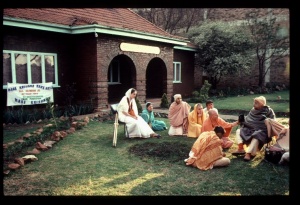SB 9.4.31-32: Difference between revisions
m (1 revision(s)) |
No edit summary |
||
| Line 1: | Line 1: | ||
{{info | {{info | ||
|speaker= | |speaker=Śukadeva Gosvāmī | ||
|listener=King | |listener=King Parīkṣit | ||
}} | }} | ||
[[Category:Srimad-Bhagavatam - Canto 09 Chapter 04]] | |||
[[Category:Bhagavatam Verses Spoken by Sukadeva Gosvami - Vanisource|090431]] | |||
<div style="float:left">'''[[Srimad-Bhagavatam]] - [[SB 9|Ninth Canto]] - [[SB 9.4: Ambarisa Maharaja Offended by Durvasa Muni|Chapter 4: Ambarīṣa Mahārāja Offended by Durvāsā Muni]]'''</div> | |||
<div style="float:right">[[File:Go-previous.png|link=SB 9.4.30]] '''[[SB 9.4.30]] - [[SB 9.4.33-35]]''' [[File:Go-next.png|link=SB 9.4.33-35]]</div> | |||
{{RandomImage}} | |||
==== TEXTS 31-32 ==== | ==== TEXTS 31-32 ==== | ||
<div | <div class="verse"> | ||
mahābhiṣeka-vidhinā | :mahābhiṣeka-vidhinā | ||
sarvopaskara-sampadā | :sarvopaskara-sampadā | ||
abhiṣicyāmbarākalpair | :abhiṣicyāmbarākalpair | ||
gandha-mālyārhaṇādibhiḥ | :gandha-mālyārhaṇādibhiḥ | ||
tad-gatāntara-bhāvena | |||
pūjayām āsa keśavam | :tad-gatāntara-bhāvena | ||
brāhmaṇāṁś ca mahā-bhāgān | :pūjayām āsa keśavam | ||
siddhārthān api bhaktitaḥ | :brāhmaṇāṁś ca mahā-bhāgān | ||
:siddhārthān api bhaktitaḥ | |||
</div> | </div> | ||
| Line 21: | Line 27: | ||
==== SYNONYMS ==== | ==== SYNONYMS ==== | ||
<div | <div class="synonyms"> | ||
mahā-abhiṣeka- | ''mahā-abhiṣeka-vidhinā''—by the regulative principles for bathing the Deity; ''sarva-upaskara-sampadā''—by all the paraphernalia for worshiping the Deity; ''abhiṣicya''—after bathing; ''ambara-ākalpaiḥ''—with nice clothing and ornaments; ''gandha-mālya''—with fragrant flower garlands; ''arhaṇa-ādibhiḥ''—and with other paraphernalia to worship the Deity; ''tat-gata-antara-bhāvena''—his mind saturated with devotional service; ''pūjayām āsa''—he worshiped; ''keśavam''—unto Kṛṣṇa; ''brāhmaṇān ca''—and the ''brāhmaṇas''; ''mahā-bhāgān''—who were greatly fortunate; ''siddha-arthān''—self-satisfied, without waiting for any worship; ''api''—even; ''bhaktitaḥ''—with great devotion. | ||
</div> | </div> | ||
| Line 28: | Line 34: | ||
==== TRANSLATION ==== | ==== TRANSLATION ==== | ||
<div | <div class="translation"> | ||
Following the regulative principles of mahābhiṣeka, Mahārāja Ambarīṣa performed the bathing ceremony for the Deity of Lord Kṛṣṇa with all paraphernalia, and then he dressed the Deity with fine clothing, ornaments, fragrant flower garlands and other paraphernalia for worship of the Lord. With attention and devotion, he worshiped Kṛṣṇa and all the greatly fortunate brāhmaṇas who were free from material desires. | Following the regulative principles of mahābhiṣeka, Mahārāja Ambarīṣa performed the bathing ceremony for the Deity of Lord Kṛṣṇa with all paraphernalia, and then he dressed the Deity with fine clothing, ornaments, fragrant flower garlands and other paraphernalia for worship of the Lord. With attention and devotion, he worshiped Kṛṣṇa and all the greatly fortunate brāhmaṇas who were free from material desires. | ||
</div> | </div> | ||
__NOTOC__ | |||
<div style="float:right; clear:both;">[[File:Go-previous.png|link=SB 9.4.30]] '''[[SB 9.4.30]] - [[SB 9.4.33-35]]''' [[File:Go-next.png|link=SB 9.4.33-35]]</div> | |||
__NOTOC__ | |||
__NOEDITSECTION__ | |||
Revision as of 08:28, 15 May 2021

A.C. Bhaktivedanta Swami Prabhupada
TEXTS 31-32
- mahābhiṣeka-vidhinā
- sarvopaskara-sampadā
- abhiṣicyāmbarākalpair
- gandha-mālyārhaṇādibhiḥ
- tad-gatāntara-bhāvena
- pūjayām āsa keśavam
- brāhmaṇāṁś ca mahā-bhāgān
- siddhārthān api bhaktitaḥ
SYNONYMS
mahā-abhiṣeka-vidhinā—by the regulative principles for bathing the Deity; sarva-upaskara-sampadā—by all the paraphernalia for worshiping the Deity; abhiṣicya—after bathing; ambara-ākalpaiḥ—with nice clothing and ornaments; gandha-mālya—with fragrant flower garlands; arhaṇa-ādibhiḥ—and with other paraphernalia to worship the Deity; tat-gata-antara-bhāvena—his mind saturated with devotional service; pūjayām āsa—he worshiped; keśavam—unto Kṛṣṇa; brāhmaṇān ca—and the brāhmaṇas; mahā-bhāgān—who were greatly fortunate; siddha-arthān—self-satisfied, without waiting for any worship; api—even; bhaktitaḥ—with great devotion.
TRANSLATION
Following the regulative principles of mahābhiṣeka, Mahārāja Ambarīṣa performed the bathing ceremony for the Deity of Lord Kṛṣṇa with all paraphernalia, and then he dressed the Deity with fine clothing, ornaments, fragrant flower garlands and other paraphernalia for worship of the Lord. With attention and devotion, he worshiped Kṛṣṇa and all the greatly fortunate brāhmaṇas who were free from material desires.